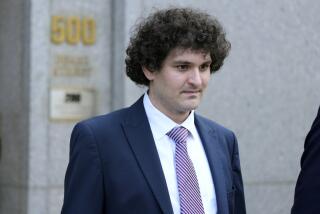Court Urged to Uphold Winans’ Convictions
- Share via
WASHINGTON — The Supreme Court was urged Wednesday to uphold novel insider trading securities fraud convictions of a former Wall Street Journal reporter and two others who profited from stocks the reporter was writing about.
Solicitor General Charles Fried, the Reagan Administration’s top courtroom lawyer, said there would be “a cascading deterioration” of laws protecting investors if the justices sanction “profit from stolen information.”
Fried, noting that the stock market scheme netted nearly $700,000 in profit, denied that the government was overreaching in using the securities laws to convict former Wall Street Journal reporter R. Foster Winans, his former roommate and a stockbroker.
The government previously has argued that exempting Winans and his co-defendants from prosecution could create a loophole for other accused violators of insider trading rules. It cited takeover speculator Ivan F. Boesky, investment banker Martin A. Siegel and former investment banker Dennis B. Levine.
But the justices, who are expected to announce their decision in the Winans case by July, repeatedly expressed doubts about the government’s arguments.
Chief Justice William H. Rehnquist said federal securities law did not seem to cover the Winans case. “You’re putting layers on” the law, Rehnquist told Fried.
Justice Antonin Scalia said Fried was making “strange usage of the word fraud.”
Concedes Violations
Don D. Buchwald, a lawyer representing the three defendants, said the government is trying to convert the Wall Street Journal’s rules for ethical conduct by its employees into a federal law.
Accepting the government’s theory would mean that “you’ve elevated every ethical breach into a violation of federal law,” Buchwald said.
He conceded that Winans violated the newspaper’s rules. But he said the remedy for such misconduct is to fire the reporter, adding, “They effectively drummed him out of the profession.”
Winans, who was in the courtroom Wednesday, has been sentenced to 18 months in prison for securities fraud and mail and wire fraud.
The mail and wire fraud charges stemmed from the fact that Wall Street Journal articles are transmitted by telephone line to its printing plant and the newspaper is mailed to subscribers.
Winans was one of two Wall Street Journal reporters who took turns writing the newspaper’s “Heard on the Street” column from August, 1982, through 1984.
The daily feature is believed to cause sharp, if temporary, fluctuations in the price of stocks discussed in the column.
Winans revealed the subject matter of some columns in advance to two stockbrokers, Peter Brant and Kenneth Felis.
Prosecutors said the stockbrokers made about $690,000 and paid about $31,000 in kickbacks to Winans and his former roommate David Carpenter, who had worked as a clerk at the newspaper and was an alleged errand boy in the scheme.
Brant became the government’s key witness; Felis was sentenced to six months in prison, and Carpenter was placed on three years probation.
More to Read
Inside the business of entertainment
The Wide Shot brings you news, analysis and insights on everything from streaming wars to production — and what it all means for the future.
You may occasionally receive promotional content from the Los Angeles Times.










